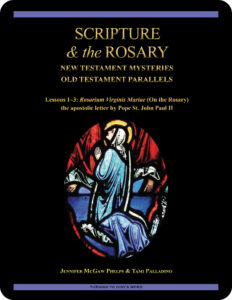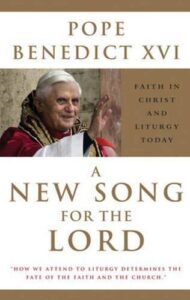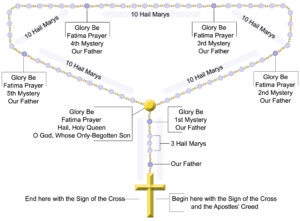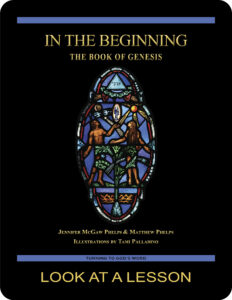 Scripture & the Rosary:
Scripture & the Rosary:
New Testament Mysteries,
Old Testament Parallels
Rosarium Virginis Mariae
Lesson 2 The Rosary: A Compendium of the Gospel
Rosarium Virginis Mariae (chapter 2)
Revised Standard Version Catholic Edition (RSVCE)*
New American Bible Revised Edition (NABRE)*
Catechism of the Catholic Church
Rosarium Virginis Mariae (Rosary of the Virgin Mary)
ex libris (in our library)
Evangelium Vitae (Gospel of Life)
Familiaris Consortio (Role of the Christian Family in the Modern World)
Novo Millennio Ineunte (Beginning of the New Millennium)
Redemptor Hominis (Redeemer of Man)
Redemptoris Mater (Mother of the Redeemer)
Salvifici Doloris (On the Christian Meaning of Redemptive Suffering)
cross references for Scripture & the Rosary
glossary for Scripture & the Rosary
next lesson: Assimilating the Mystery of Christ
This material coordinates with Lesson 2 on pages 8–9 in Scripture & the Rosary: New Testament Mysteries, Old Testament Parallels.
And Mary said, “My soul magnifies the Lord, and my spirit rejoices in God my Savior,
for he has regarded the low estate of his handmaiden.
For behold, henceforth all generations will call me blessed;
for he who is mighty has done great things for me, and holy is his name.”
—the Gospel According to Luke 1:46–49
welcome to our in-depth study of Scripture & the Rosary
We invite groups and individuals to become acquainted with Turning to God’s Word Catholic Bible  studies through
studies through  Scripture & the Rosary: New Testament Mysteries, Old Testament Parallels, which has been granted an imprimatur. Although no longer available in print, the first six lessons can be downloaded from our website. The remaining 20 lessons are posted throughout the liturgical year along with their related online study pages. Click here to access Lesson 1 through Lesson 3. If you have a Bible-related question or comment, you can use one of the “ask us your question” or “what do you think” buttons on any online study page to contact our authors.
Scripture & the Rosary: New Testament Mysteries, Old Testament Parallels, which has been granted an imprimatur. Although no longer available in print, the first six lessons can be downloaded from our website. The remaining 20 lessons are posted throughout the liturgical year along with their related online study pages. Click here to access Lesson 1 through Lesson 3. If you have a Bible-related question or comment, you can use one of the “ask us your question” or “what do you think” buttons on any online study page to contact our authors.
open with prayer
It’s always wise to begin any Bible study with prayer, whether reading the Scriptures alone or meeting with others in a discussion group. You can pray using your own words or use one of the opening prayers on our website. We especially like the following:
Lord Jesus, you promised to send your Holy Spirit to teach us all things.
As we read and study your word today,
allow it to touch our hearts and change our lives. Amen.
praying with the Gospels
Lesson 2 continues to look at Rosarium Virginis Mariae (Rosary of the Virgin Mary). The questions are based on materials in the second chapter of that apostolic letter. As in Lesson 1 Contemplating Christ with Mary, each of the bold-faced labels that introduces a question in this section of Scripture & the Rosary matches a subhead of the section of the apostolic letter on which that question is based.
the popes inspire us—the Rosary & the Gospel
Lesson 1 Contemplating Christ with Mary examined the three major concerns that Pope St. John Paul II believed contributed to what he called “a crisis of the  Rosary.” Lesson 2 looks at the relationship between the Rosary prayers and the Gospel message. Surprisingly, there are a number of people who don’t realize that the Rosary is centered around major events in Jesus’ life. The Rosary Mysteries group these events into four categories—joyful, sorrowful, glorious, and luminous. Of particular interest in this lesson is this statement from Pope St. John Paul II: “Anyone who contemplates Christ through the various stages of his life cannot fail to perceive in him the truth about man.” This “truth about man” means that by contemplating the life of Jesus Christ we’re able to shed light on important truths about human life, and more specifically, about our individual lives. Contemplative prayer is a deeply personal endeavor, and one from which all men and women can benefit.
Rosary.” Lesson 2 looks at the relationship between the Rosary prayers and the Gospel message. Surprisingly, there are a number of people who don’t realize that the Rosary is centered around major events in Jesus’ life. The Rosary Mysteries group these events into four categories—joyful, sorrowful, glorious, and luminous. Of particular interest in this lesson is this statement from Pope St. John Paul II: “Anyone who contemplates Christ through the various stages of his life cannot fail to perceive in him the truth about man.” This “truth about man” means that by contemplating the life of Jesus Christ we’re able to shed light on important truths about human life, and more specifically, about our individual lives. Contemplative prayer is a deeply personal endeavor, and one from which all men and women can benefit.
WHAT DO YOU THINK of as your life’s purpose?
As we move forward in this study, try to relate the events described in the Rosary Mysteries to your own situation.
 ? What are the big questions that you have about your own life and purpose?
? What are the big questions that you have about your own life and purpose?
? What help can you ask God to give you that might increase your understanding of the mysteries that constitute your life?
? What are some of the key events in your life?
? How do these relate to your faith in Jesus Christ?
? What benefit can you see to making a conscious effort to remember the ways in which your faith has played an important role in who you are?
the mystery of humanity
Pope St. John Paul II wrote much about how Jesus Christ illuminates our understanding of the human condition. For a list of some of his major writings on the subject, refer to “More About the Mystery of Humanity” on page 8 in Scripture & the Rosary: New Testament Mysteries, Old Testament Parallels.
 ex libris—more about religious mysteries
ex libris—more about religious mysteries
The idea that there are things we can’t prove through science poses a stumbling  block for many people. In his book A New Song for the Lord: Faith in Christ and Liturgy Today, Pope Benedict XVI addresses the relationship between liturgy and mystery. Read another excerpt from the book and learn more about this and other books related to Catholic Scripture study at ex libris—main bookshelf.
block for many people. In his book A New Song for the Lord: Faith in Christ and Liturgy Today, Pope Benedict XVI addresses the relationship between liturgy and mystery. Read another excerpt from the book and learn more about this and other books related to Catholic Scripture study at ex libris—main bookshelf.
… [t]he relationship to mystery means that the beginning of the liturgical event never lies in us. It is a response to an initiative coming from above, to a call and an act of love which is a mystery. Problems are there to be explained; mystery,  however, is not open to explanation, but reveals itself only in acceptance, in the yes that we, following the lead of the Bible, may confidently call, even today, obedience.
however, is not open to explanation, but reveals itself only in acceptance, in the yes that we, following the lead of the Bible, may confidently call, even today, obedience.
 prayer—you could look it up in our archives
prayer—you could look it up in our archives
There are any number of effective ways to pray. In the eleventh chapter of the Gospel According to Luke, Jesus teaches his disciples to pray the “Our Father” or “Lord’s Prayer.” To learn more about prayer, read Lost in Translation, an online column in which Turning to God’s Word author Matthew Phelps helps readers connect with ideas expressed in the original languages of the Scriptures. The fourth (and final) section of the Catechism of the Catholic Church contains much valuable information about prayer and its benefits of prayer. New Lost in Translation entries are posted on Mondays, and past entries are archived on our website. Contact us if you’d like to receive Lost in Translation by email every week.
a study leader shares her thoughts
The following exchange veers from our standard question-and-answer format, but others may find it helpful. It comes from a study leader in a group planning to tackle one of our other studies.
 comment: Thank you for your online pages. They are such a bonus. In our Bible study more questions come up in our leaders’ group than in my individual group about why you ask a certain question, or what you might be thinking, or where you are leading with your questions. I’ve often been able to point to the online pages for direction and clues. I need to remind the other group leaders and myself that you’re trying to get us to think and pray about Scripture and its impact in our lives rather than limiting Bible study to an assignment that can be completed with a single academic answer.
comment: Thank you for your online pages. They are such a bonus. In our Bible study more questions come up in our leaders’ group than in my individual group about why you ask a certain question, or what you might be thinking, or where you are leading with your questions. I’ve often been able to point to the online pages for direction and clues. I need to remind the other group leaders and myself that you’re trying to get us to think and pray about Scripture and its impact in our lives rather than limiting Bible study to an assignment that can be completed with a single academic answer.
response: We appreciate your comments, especially since we know that the online pages are not everyone’s cup of tea. We go to some effort to provide optional supplemental information here and in the videos for participants who are interested.
Matthew, Tami, and I feel that it’s important for people to know that sometimes asking the right questions is more valuable than having all the answers. It took us at Turning to God’s Word some time to get to this idea. The bottom line is that no one is able to hold onto information that they’re spoon-fed the same way that they can remember and live it when they have to dig concepts out for themselves. This is a big departure from the popular scholarly model of Bible study where everyone expects an expert to tell them what stuff means, what’s important, and why. Sometimes when one of us sits in with a group, a participant will ask what we were going for with a particular question. People almost always find it shocking when they’re told that we were thinking we wouldn’t mind hearing a discussion about what others think about the passage in question.
Studying Scripture presents some special stumbling blocks. Some images and ideas in the Old Testament we might or might not recognize as also occurring in the New Testament. There’s a danger that we become so concerned with understanding the message as it originally would have been received that we miss noticing that everything points toward Jesus. Then there’s the other side of that danger, in which we concentrate so much on a Christian interpretation that we miss important historical information that can shed light on Jesus and what he came to do. Finally, there’s a very real danger that we begin to view Jesus as the end point and miss seeing that the work of the Church continues and only has begun with Jesus’ death and Resurrection.
It’s easy to get derailed in one area and miss the big picture, which is why group discussion of the questions is helpful. If one person is focusing on Old Testament history, someone else may be looking at the particular way the writing points to Jesus. Another person may be concentrating on how these ancient books are relevant in today’s world. All these different points of view combine to give us a clearer picture of what God is saying to us in Scripture.
more about the online study pages & videos
We hope that some people will find Bible study so compelling that they’ll want more information than realistically fits in the study books. We want to provide a vehicle for extra material and an easy way for people to ask questions and make comments, especially with so many contradictory views floating around on the Internet and elsewhere.
It also is our intent that the books, the online study pages, and the videos each can stand alone if need be. We don’t want financial concerns or the lack of a compatible group to prevent anyone from reading and praying with the Bible. We know that there are people in our groups who never read the online pages or watch the videos, just as there are people who do all of those things and more. The only necessary part of studying the Bible, however, is reading the Bible. Everything else is secondary.
The caution we would add is that if you’re limiting your Bible study experience to reading the Bible—and  you’re aware that you don’t understand what you’re reading—you probably should take a
you’re aware that you don’t understand what you’re reading—you probably should take a  look at our online commentaries and listen to any related videos. Turning to God’s Word author Matthew Phelps frequently addresses some of the more obvious difficulties in those places. If you’ve read all of our related commentaries and watched our related videos and still have questions, shoot us an email. We’re always happy to discuss Scripture, and some of our most cherished insights have come about in conversation with others.
look at our online commentaries and listen to any related videos. Turning to God’s Word author Matthew Phelps frequently addresses some of the more obvious difficulties in those places. If you’ve read all of our related commentaries and watched our related videos and still have questions, shoot us an email. We’re always happy to discuss Scripture, and some of our most cherished insights have come about in conversation with others.
don’t forget about our indexes & extra online material

 If you’re trying to locate information about a Scripture passage, you can look it up in the index at the back of the online version of this study. If you want to revisit a commentary, you can look it up by title in the topics index. If you want to learn more about another book of the Bible for which there’s a Turning to God’s Word study, you can read online commentaries and watch any accompanying videos by choosing a lesson from one of the study directories. (There are no lesson videos with Scripture & the Rosary: New Testament Mysteries, Old Testament Parallels.) Finally, if you have a question or would like to make a comment about any of our studies, you can use the “ask us your question” or “what do you think” button to email our authors.
If you’re trying to locate information about a Scripture passage, you can look it up in the index at the back of the online version of this study. If you want to revisit a commentary, you can look it up by title in the topics index. If you want to learn more about another book of the Bible for which there’s a Turning to God’s Word study, you can read online commentaries and watch any accompanying videos by choosing a lesson from one of the study directories. (There are no lesson videos with Scripture & the Rosary: New Testament Mysteries, Old Testament Parallels.) Finally, if you have a question or would like to make a comment about any of our studies, you can use the “ask us your question” or “what do you think” button to email our authors.
ex libris—Church documents & books about religious topics
Link to magisterial documents referred to in our Bible studies at ex libris—magisterial documents.  This listing includes significant recent encyclicals as well as a number of historical Church documents. Recommended books related to Scripture study can be found at ex libris—main bookshelf.
This listing includes significant recent encyclicals as well as a number of historical Church documents. Recommended books related to Scripture study can be found at ex libris—main bookshelf.
pray the Rosary
 We invite you to pray the Rosary along with Turning to God’s
We invite you to pray the Rosary along with Turning to God’s  Word co-founder Tami Palladino and her daughter Anne Marie. Their videos are available on the online study pages for Lessons 7 through 26, and the Rosary prayers as well as the videos for all 20 mysteries are accessible year-round at how to pray the Rosary. Clicking on the diagram (right) will take you to the website page with the Rosary prayers. Watch Tami and Anne Marie’s how-to video (below) to learn more about praying the Rosary.
Word co-founder Tami Palladino and her daughter Anne Marie. Their videos are available on the online study pages for Lessons 7 through 26, and the Rosary prayers as well as the videos for all 20 mysteries are accessible year-round at how to pray the Rosary. Clicking on the diagram (right) will take you to the website page with the Rosary prayers. Watch Tami and Anne Marie’s how-to video (below) to learn more about praying the Rosary.
Lesson 3 Assimilating the Mystery of Christ—Rosarium Virginis Mariae (chapter 3 and conclusion)
Lesson 1 Contemplating Christ with Mary—Rosarium Virginis Mariae (introduction and chapter 1)
you also may like our study of the book of Genesis
 The first seven lessons of In the Beginning: The Book of Genesis, a 28-lesson Catholic Bible study with an imprimatur, provide an in-depth look at the very earliest biblical history—including the two accounts of Creation, events surrounding the Fall of Adam and Eve, the relationship between Cain and Abel, and the baptismal foreshadowing present in the account of Noah and the Flood. Remaining lessons look at lives of the patriarchs Abraham, Isaac, Jacob, and Joseph. Click on the book’s cover to view a sample lesson.
The first seven lessons of In the Beginning: The Book of Genesis, a 28-lesson Catholic Bible study with an imprimatur, provide an in-depth look at the very earliest biblical history—including the two accounts of Creation, events surrounding the Fall of Adam and Eve, the relationship between Cain and Abel, and the baptismal foreshadowing present in the account of Noah and the Flood. Remaining lessons look at lives of the patriarchs Abraham, Isaac, Jacob, and Joseph. Click on the book’s cover to view a sample lesson.
start a Turning to God’s Word Bible study
Thank you for your interest in Scripture & the Rosary: New Testament Mysteries, Old Testament Parallels. 
 Information about beginning a Turning to God’s Word Bible study can be found at start a Bible study. Tami, Matthew, and I are available to answer your questions and to offer support. You may use this email to contact us directly if you’re interested in starting a Turning to God study or in having your study schedule listed with other TtGW study groups on our website. —Jennifer
Information about beginning a Turning to God’s Word Bible study can be found at start a Bible study. Tami, Matthew, and I are available to answer your questions and to offer support. You may use this email to contact us directly if you’re interested in starting a Turning to God study or in having your study schedule listed with other TtGW study groups on our website. —Jennifer
*There are seven deuterocanonical books in the Old Testament—the Books of Tobit, Judith, Wisdom, Sirach, Baruch, and First and Second Maccabees, as well as some passages in the Books of Esther and Daniel. Protestants usually refer to these works as “apocryphal,” a word that means “outside the (Protestant) canon” because they’re excluded from most Protestant Bibles. The word “deuterocanonical” means “second canon”; Catholics use that word to refer to any section of the Catholic Old Testament for which there are no extant, or existing, Hebrew manuscripts. All of the deuterocanonical books appear in the Septuagint, the earliest remaining versions of which date to the 1st century B.C. This Greek translation of the Old Testament was in common use by Jews at the time of Jesus. Learn more by reading How Do Catholic & Protestant Bibles Differ?
Turning to God’s Word printed Bible studies use the 2006 Revised Standard Version Second Catholic Edition (RSV2CE) translation for all Scripture references except those to the Psalms, which are taken from The Abbey Psalms and Canticles, prepared by the Benedictine monks of Conception Abbey and published in 2020 by the United States Conference of Catholic Bishops (USCCB). All Scripture links for the digital version of Scripture & the Rosary: New Testament Mysteries, Old Testament Parallels are to the 1966 Revised Standard Version Catholic Edition (RSVCE) translation. The New International Version (NIV) audio recordings follow the same chapter and verse numbering as the RSV Catholic translations, but the NIV translation doesn’t include the deuterocanonical books and passages.
The 1966 RSVCE uses archaic pronouns and verb forms such as “thee,” “thou,” “didst” in the Psalms and in direct quotations attributed to God. The 2006 RSV2CE replaces these with more accessible English. The few significant translation changes in the RSV2CE include rendering almah as “virgin” in the Book of Isaiah 7:14 and restoring the term “begotten” in the Gospel According to John 3:16.
Numbering varies for some passages in this Bible study. Turning to God’s Word studies follow the numbering in the Revised Standard Version Catholic translations (RSV2CE and RSVCE). Discrepancies in the New American Bible Revised Edition (NABRE) are noted in the Index of Scripture Citations.
 You can learn more about the Psalms by viewing a sample lesson from the Turning to God’s Word Catholic Bible study Sing a New Psalm: Communicating with God Through the Prayers of the Church—Volume I: Lauds & Vespers. The second part of that study, Sing a New Psalm: Communicating with God Through the Prayers of the Church—Volume II: Vigils, Day Prayer & Compline, is scheduled for publication in 2025. Some verse numbers may vary in different translations of the Psalms.
You can learn more about the Psalms by viewing a sample lesson from the Turning to God’s Word Catholic Bible study Sing a New Psalm: Communicating with God Through the Prayers of the Church—Volume I: Lauds & Vespers. The second part of that study, Sing a New Psalm: Communicating with God Through the Prayers of the Church—Volume II: Vigils, Day Prayer & Compline, is scheduled for publication in 2025. Some verse numbers may vary in different translations of the Psalms.
